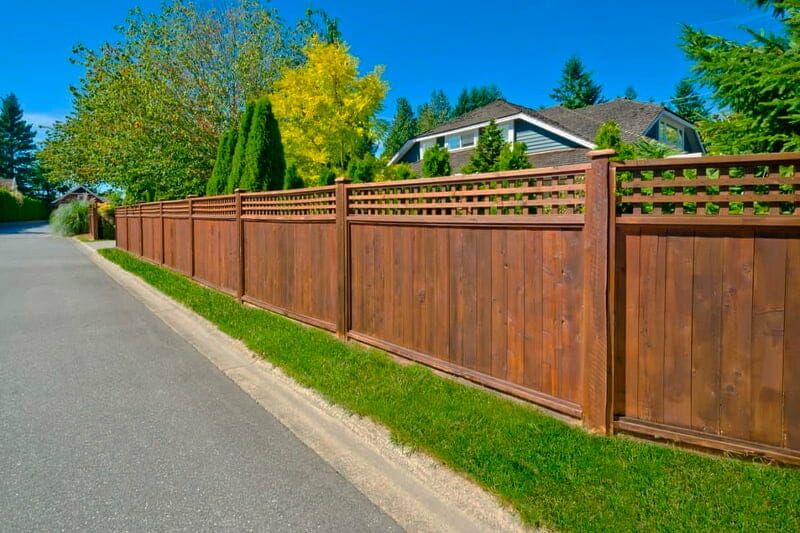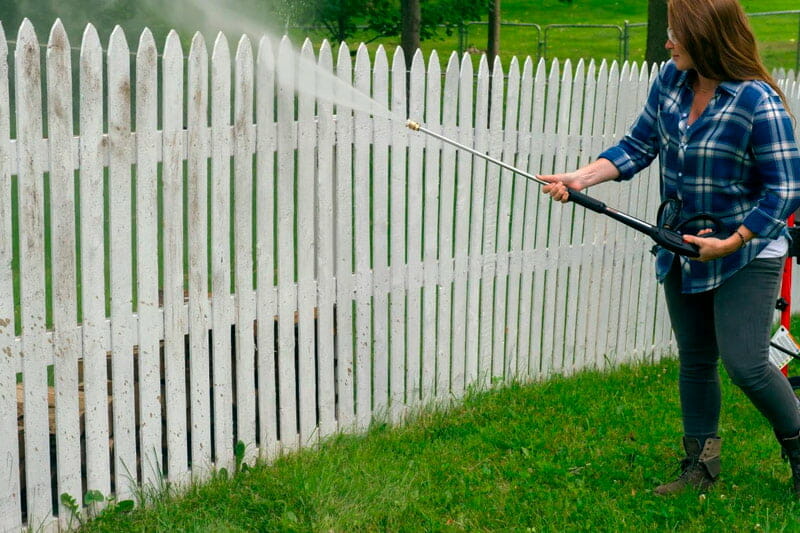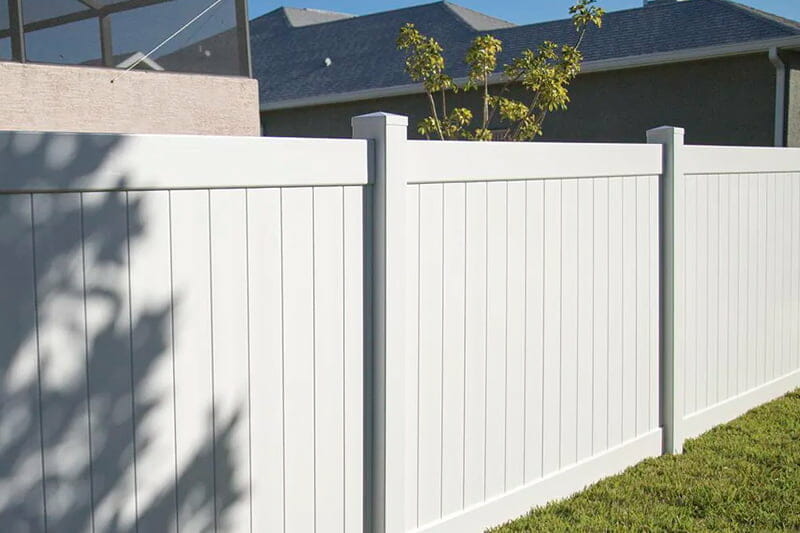A barrier around one’s home is crucial for defense against external threats. Many types of materials are available for constructing these barriers, but wood stands out as a common pick. Its appeal, durability, and long-lasting nature have made it a favorite among many neighborhoods.
Proper installation, care, and maintenance of your wooden fence ensure that it serves you a long time. Regular inspection, repair of damage, repainting, and maintenance extend the life of a wooden fence.
A wooden fence can serve its purpose for up to 20 years. Your fence needs you to take proper care of it to last as long as recommended. Here’s how to extend the life of your wooden fence.

How To Extend The Life Of Your Wooden Fence
Repair Damage Quickly
One way of extending the life of your fence is regular inspection. You will identify parts of the fence that are damaged or have lots of wear and tear.
When you identify damaged areas, don’t wait. Act fast to repair the fence. If you can’t do it by yourself, get a professional to do it for you.
Clean/ Pressure Wash Your Wooden Fence regularly
Another way to extend the life of a wooden fence is a regular wash. Wash your fence every 3 to 5 years or fewer.
Mold and mildew are likely to grow on your wooden fence due to weather factors. Only a strong pressure wash can remove the mold growing on your fence. Mix your cleaning water with a mold killer before you use a pressurized washing machine to spray it onto the fence.
Once your fence is clean, apply a water-repellent coating. The coating will prevent the wood from absorbing moisture which causes the growth of mold and mildew.
A clean fence enhances the curb appeal of your property. Regular cleaning ensures that the fence remains strong enough to remain standing for a long time.

Seal your fence
Stain your fence as regularly as you clean. Apply a coat of stain on your wooden fence after every pressure wash.
Only use oil-based stains for wood for your fence. First, make sure that your fence is clean and has no mold or mildew growing on it. Also, ensure that it is dry before you apply a coat of waterproof stain.
Staining a well-looked-after wooden fence ensures that it lasts long and looks good. Staining protects the wood when the paint peels off. The wood stain goes deeper into the wood and doesn’t peel off as easily as paint.
Use a single layer of stain when you use colored stain and two layers when you use colorless stain.
Be careful when you stain your wooden fence. Staining and washing wooden fences is best done in spring. There’s not much humidity in the air and the wooden fence dries faster and to the required levels for the application of paint. Leave it to dry for about a week before you can apply the stain.
Staining your wooden fence is better than painting it. Once the stain is absorbed into the wood, it cannot peel off. Thus, providing more protection n the long term than paint.
Regular Oiling of Hinges And Other Movable Parts
To make sure that your wooden fence lasts long, oil all parts of the fence that move regularly. If you have a gate on your fence, make sure the hinges are properly oiled. It ensures that the gate swings open and shut easily
If you stay too long without oiling the hinges, they may crack and cause the gate to fall. It also causes your gate to make lots of noise when it is opened or closed.
Properly oiled hinges and locks last longer. Every time you replace your hinges and locks, you damage the part of the wood on which they are nailed. To prevent this from happening, oil all the moving parts on your wooden fence.
Prevent Direct Contact With Soil And Moisture
There are several methods you can use to prevent your fencing posts from coming into direct contact with soil and moisture.
You can use a rot board. A rot board is a board fixed at the bottom of the fencing posts. Rot boards eliminate contact with moisture and soil.
Soil has organisms that can eat into the wood and weaken it. While moisture gets into the wood and also weakens and causes it to rot. If you have sprinklers in your yard, ensure they don’t sprinkle water on your fence.
Make sure your rot board is pressure treated too. If the rot board rots the fence posts will also rot.
You can also use a galvanized metal sheet at the bottom as a rot board. It will not rust and will protect your fence from moisture and soil.
Additionally, you can spread gravel around the bottom of your fence posts. This also protects your post from soil and moisture and also allows water to drain quickly away from the posts.
You can also paint the bottom of the fence posts with an asphalt emulsion. Mix asphalt, water, and an emulsifier to make an emulsion that seals the pores on the bottom of the posts. This keeps moisture and pests away from the posts and ensures they can remain standing longer.
Use Stainless Steel Nails
When putting up your fence, use only stainless steel nails. They are more expensive than other types of nails. However, they will last as long as your fence and will not rust.
Other types of nails will rust. Their rust can infect your wooden posts and your fence will start rusting.
As you choose high-quality, rot-resistant wood for your fencing posts, also use stainless steel nails. Every other metal part that will be part of the fence should also be made of stainless steel to protect the wooden posts from rust.
Do Not Let Water Pool Around Your Fence
Water or moisture in the wood will cause your wooden posts to rot and decay. Do not let water rest at the bottom of your fence.
Ensure that you have good drainage near your fence. It will protect your fence from water that pools at its bottom. Adding some gravel at the bottom of the fence also helps water to drain away from the fence faster.
FAQ's
Vinyl fencing doesn’t face the same problems of rot and decay as a wooden fence does. As a result, a vinyl fence is more durable. It is also a low-maintenance fence that doesn’t require regular painting and sealing.
Modern vinyl fencing is appealing. It is available in different styles and can even look like a wooden fence. It is strong and can withstand extreme weather conditions. It has UV protection that protects its color and ensures it doesn’t fade. This means that you don’t need to repaint it as regularly as a wooden fence.
Vinyl fencing is more expensive than wooden fencing.

Regular inspection and repair of your wooden fence is a recommended practice for it to serve you for long.
First, check for signs of rot on your wooden fence. If there are any, pick a brush and scrub the rotting part. Once the rot is cleared, wash the post or rotten part of the fence. Wash with water mixed with bleach. Then wait for the wood to dry. When the wood is dry, you can use an environmentally friendly sealant to apply to the fence.
Also, check for points on your fence that are broken. You can use nails to fix the broken with small pieces of similar wood. Make sure that the pieces of wood you use to repair or the posts you replace with are pressure treated before fixing them onto your fence.
If you can’t carry out repairs by yourself, you can contact a pro to do it for you. It will be more expensive than a DIY but it will be well done.
Pressure-treating wood for your fence ensures that the fence doesn’t rot and decay.
Wood that comes into contact with moisture and soil will decay. It is a natural response from wood.
When you apply pressure treatment to your wooden fence posts, you prevent this natural process from taking place. Pressure treatment of fencing posts infuses in them a chemical that prevents them from decaying when in contact with soil and moisture.
However, prolonged exposure to these factors, or before the treatment dries may cause the wooden fence to rot and decay.
A wooden fence can last for up to 20 years if well maintained. There are other types of fences that can last longer,
Stone and metal fences can last a lifetime. Protect metal fences from rust. It will ensure that they serve you for a long time.
Stone fences are the most long-lasting type of fence. They do not rot or rust. They are strong enough to withstand the effect of strong winds, sun, or rain. Unless you bring it down, a well-built stone fence will last a lifetime.







